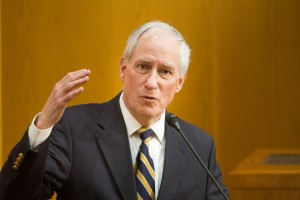The director of Harvard University’s library received the 2014 Kennedy Center Book of the Year Award Wednesday on BYU campus.
Robert Darnton, the Carl H. Pforzheimer professor at Harvard and winner of the award, addressed BYU students and faculty in accepting the honor for the book “Poetry and the Police: Communication Networks in Eighteenth-Century Paris.”
Through its Book of the Semester program, the Kennedy Center provides students the opportunity to be exposed to ideas and topics outside their disciplines.
“We identify a notable book that has an international focus that we think is worth reading,” said Cory Leonard, assistant director of special programs at the Kennedy Center. “As part of the program we bring the author in.”

Darnton is the 18th recipient of the award bestowed by the David M. Kennedy Center for International Studies. In addition to his responsibilities at Harvard, Darton previously taught at Princeton from 1968 to 2007 and was awarded the National Humanities Medal by President Barack Obama in February 2012.
“Poetry and the Police” explores the impact of poetry, song and satire in driving the cultural and social scene in France during the 1700s. In his lecture, Darnton described how messages critical of the government were passed through oral and printed media to reach the wider public.
“The police found that there were lots of poems that were circulating, and they began hauling in people, so they were recreating a communication network,” Darnton said.
Rumors of infidelity and corruption in the ruling class were widely circulated among the young, educated classes of French society.
“His main idea is that communication networks, social networks, the blogosphere, if you will, existed long before electronic technology. The book is really about those kind of social networks that existed in 18th-century Paris,” Leonard said.
While the mediums of poetry and verse in the 18th century differ from today’s methods of blog posts and status updates, the central principles of communication remain unchanged.
“It shows the importance of understanding historical perspectives, or understanding other cultures, and the more we think things change, the more they stay the same,” Leonard said.
It is precisely this type of exposure that the Kennedy Center hopes to inculcate in the BYU student body.
According to Blythe Beecroft, teaching assistant for the lecture series, the Book of the Semester program draws students from a rich variety of majors. Beecroft believes the most valuable perspective students gain by hearing these lectures is the determination to go enact change.
“We hope students will think about something, have a question and act on what you heard,” said Beecroft, a senior studying international relations.
Other past Book of the Semester winners include Jared Diamond, with his Pulitzer Prize-winning “Guns Germs and Steel”; historian John Lewis Gaddis of Yale University; and Frank Foer, author of “How Soccer Explains the World.”
The David M. Kennedy Center has been presenting the award since 2003. Through its Book of the Semester program, the center hopes to drive conversation around relevant social issues within the broader context of historical precedence, international affairs and current events.
For the first time to date, the speech was streamed live on Youtube, and video and podcast archives are available at kennedy.byu.edu/archive.




